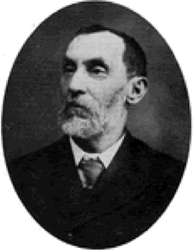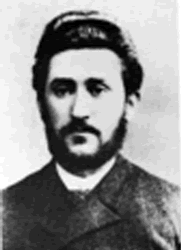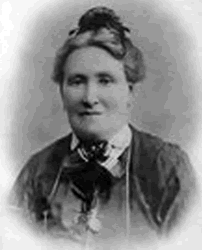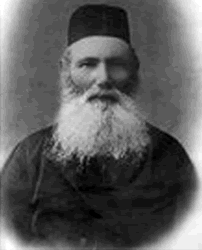(Zheludok 1867– Carlsbad 1921)
Abraham Leib Shelkowitz [ known as Ben Avigdor ]
(Zheludok 1867– Carlsbad 1921)

(Information copied from the net- by google)
Brother of Solomon Hirsch (Zvi) Goldman, the father of Nahum Goldman. Their parents lived in Vishnevo c 1900.
his brother (Sholomon Goldman)
Polish Hebrew writer and publisher. He lived in Warsaw, where he founded the series of small booklets called "Penny Books," which contained Hebrew belles-lettres. These introduced European literary trends into Hebrew literature. In 1893 he established the Ahiasaph publishing company and later the Tushiyyah company, which published hundreds of Hebrew books. He founded the children's weekly Olam Katan in 1901, and the Ah?isepher publications in 1913
From The Jewish Chronicle, London , October 7 1921OBITUARY
---
"BEN AVIGDOR"
Another prominent Hebrew and Yiddish writer and publisher has died in the person of Abraham Leib Shalkowitch, better known under his literary pseudonym of "Ben Avigdor." Mr. Shalkowitch was born in 1866 in the township of Zludok, in the province of Vilna. He studied in the Yeshiva until the age of eighteen, and made his debut in literature in 1899 with a series of articles in the Hebrew journal, Hameletz. Mr. Shalkowitch was from his earliest days actively connected with the Zionist Movement, and published a large number of articles and pamphlets on the subject, chiefly devoted to propaganda purposes. He was one of the founders of the Yiddish magazine, Der Volksfreund and of the Hebrew daily, Hazman. During the last ten years Mr. Shalkowitch was extremely active as head of the Warsaw firm of publishers, "Central" of which he was one of the founders. A great deal of Yiddish and Hebrew literature published in recent years is to his credit. Mr. Shalkowitch took a leading part in the establishment of the Warsaw Union of Jewish Authors, of which he was Chairman at the time of his death. He visited America in 1908, and was on his return to Warsaw from that country after a second visit, when he died in Carlsbad where he broke his journey to attend the Twelfth Zionist Congress. The funeral took place in Carlsbad amid marked manifestations of public grief. Mr Nahum Sokolow was Chairman of the funeral arrangements committee. Addresses were delivered at the graveside by Rabbi Dr. Zigler in the name of the Carlsbad Jewish community, by Dr. I. Gottlieb on behalf of the Central Committee of the Zionist Oganisation in Poland, and by Mr. I. M. Fried for the Warsaw Union of Jewish Authors
BEN-AVIGDOR
By : Herman Rosenthal Peter Wiernik
Russian Hebrew novelist and publisher; born in Zheludok, government of Wilna, in 1867. He received the usual Biblical and Talmudical education, and was expected by his parents to become a rabbi; but he was attracted by modern Hebrew and Zionism, and engaged in writing and publishing as a vocation. In 1891 he was called to Warsaw to become secretary of a Zionist society. There he began to publish a popular "library," or series of original short stories under the name "Sifre Agurah" (Penny Books), and in the following four years brought out thirty-one numbers. They included six novels and novelettes by himself, the others being by the best-known Hebrew writers of the day, such as Frischman, Pere?, Taviov, and Brainin. Later he was one of the founders, and for three years the manager of the publication society A?iasaf, which has accomplished much in spreading and popularizing the newly revived Hebrew literature. When he left the A?iasaf company he founded a similar publishing-house, called "Tushiah" (Sound Knowledge), of which he is the editor and, with M. Balascher, manager. It has published various scientific works, both original and translations, and numerous works of fiction, and is one of the most potent agencies for the diffusion of knowledge among the Hebrew reading public.BEMO?A'E
(see image) As a writer, Ben-Avigdor is original and has considerable power of description and expression. Some of his longer stories—e.g., "Leah Mokeret ha-Dagim" and "Mena?em ha-Sofer"—attracted much attention. Other stories of his and some articles gave occasion for interesting polemics. He was attacked not only for his ideas as a Nationalist, but also for his style, which he modeled after the so-called "new direction," caring more for being understood than for the purity of Biblical Hebrew. Some of his stories were published in the A?iasaf annuals.
Bibliography: Ha-Meli?, 1889, Nos. 82-86;
The Writing and Printing of Hebrew Books Circa 1905
by Zeev Gries
Ben Avigdor's "Tushiya" (Wisdom)
We will now return to Ben Avigdor, who distanced himself from "Bnei Moshe" after quitting his job running their publishing house "Ahiasaf"'. Ben Avigdor had his own ideas and in 1897 opened his own free publishing house by the name of "Tushiyah". This was happening at the same time as Ahad ha'am published his articles regarding the aforementioned Otzar Ha-Yahadut program. In the course of the first decade of his work as an independent publisher, Ben Avigdor produced hundreds of book titles and booklets, as well as initiating the first modern children magazine: "Olam Katan" (Small world, Warsaw-Krakow 1901- 1905) which was followed by a monthly for Jewish adolescents titled "Ha-Neurim" (The Youth, Warsaw-Krakow 1904-1905). Moreover, Ben Avigdor published a monthly for educators and parents titled "Pedagog" (Krakow 1903-1904).
Ben Avigdor's efforts to bring Jewish readers the best of world literature in lively modern Hebrew translation as well as the best of new Hebrew writings was framed in huge new series titled "Biblioteka" (Russian for "Library"). In this "Biblioteka", Ben Avigdor created sub divisions titled: "Bibliotheka for the adolescent (Hebrew: "Biblioteka La-Nearim), Biblioteka for Children (Hebrew: "Biblioteka Li-Yeladim"), and for the adults; "Hebrew Biblioteka" (Hebrew: Biblioteka Ivrit"). All of theses series performed a magisterial achievement, implementing his idea that unlike Ahad Ha'am and the "Benei Moshe" group who targeted the elite in Jewish society, publications expounding the message of the new world should be directed to the wide Jewish readership through a modern lively Hebrew. Indeed, Ben Avigdor managed almost to fill the Jewish book market with hundreds of new titles which drastically changed the expectations of the readers of Jewish literature written in Hebrew.10
For the first time since the days of the Roman Empire, Ben Avigdor made the Hebrew language a daily secular language that could stimulate the Jew to enter into modern life and strive to have her equal share in it. We may assume Ben Avigdor's activity reflected a response to the same attitude held, since the 1880's, by Yiddish writers and publishers. He wanted Hebrew to win the fight for the soul of the Jew in the modern world as his vernacular, as the "Lingua Franka" for Jews whose vernacular was Yiddish Ladino or Arabic. He did not want to escape the high Jewish literature, but wanted to adapt its texts for the modern Jew. Unlike Ahad Ha'am and "Benei Moshe", who were ready to waist precious time working for the thin layer of the new Jewish intellectuals, Ben Avigdor worked to inform the wide range of Jewish readers, and the volume of his production is extraordinary in every way.
It should be noted that a comparison of "Tushiyah" production to that of "Ahiasaf" publishing house decidedly shows that Ben Avigdor's enterprise outnumbered his rivals' in numerous titles. A close examination of "Ahiasaf" publications in and around 1905 demonstrates a constant effort to distribute booklets of what they perceived as popular writings (namely the writings of their fellows and themselves earlier published in "Hashiloah"). However, the number of books and booklets published by "Ahiasaf" in the period mentioned above was small indeed. This is also the case with the publications of "Moriyah", a publishing house established in Odessa by Israel's national poet Hayim Nachman Bialik. During the second decade of the twentieth century, "Moriyah" moved to Berlin, and after a few years of activity, changed its name to "Devir", moved to Tel Aviv, and became a major Israeli publishing house, which exists to this day
Shmuel Leib Gordon (1867-1933), Gordon's brother-in-law Avraham Ben Avigdor (originally Shelkovic, uncle of Nachum Goldman). Nahum Goldmann's uncle, the publisher, A.L. Shalkovich (Ben-Avigdor), bandied about the idea of a Jewish encyclopedia in the early years of the twentieth century. After his sudden death in 1921, his nephew, together with a friend, Jacob Klatzkin, set up a publishing house, Eshkol, in order to pursue the project themselves. They managed to attract the leading Jewish scholars and intellects of the day, and between 1928 and 1934 succeeded in publishing ten volumes in German and two in Hebrew...
Zheludok - an urban settlement (from 1962) in the Shuchin region of the Grodno oblast. During the time of the Oration of the Pospolita it was a town (from 1486), until 1567 - the center of the district of the Vilna province. In 1795 it became part of the Russian Empire. In 1847, there were 287 Jews, and in 1897 there were 1,372 Jews (out of a total population of 1,860). In 1921-39 it was part of Poland, the regional center of the Lida district of the province of Novogrudok.
At the time of the Polish census of 1931, there were 1,053 Jews. As of 1939, Zheludok was part of the Belarus SSR, a regional center. Between June 27, 1941 and July 9, 1944, it was occupied by German forces who killed approximately 2,000 people. Currently Zheludok has more than 3,000 people, including a few remaining Jewish families
pictures of his parents


